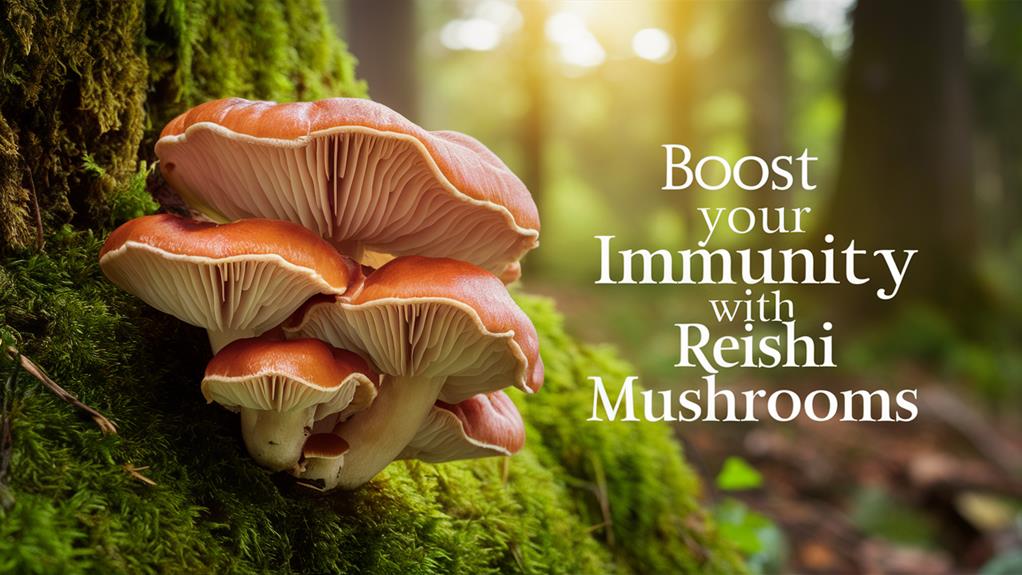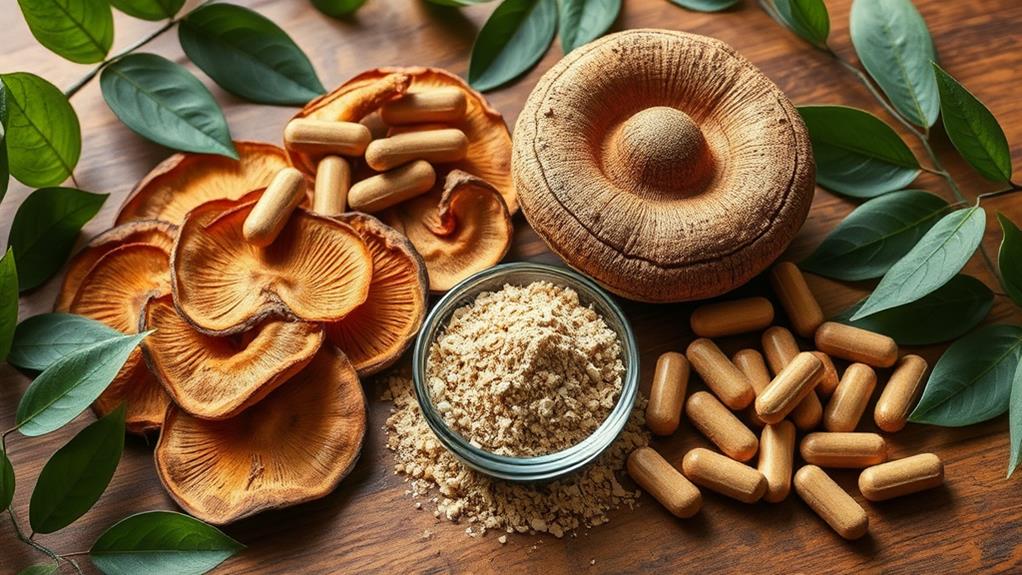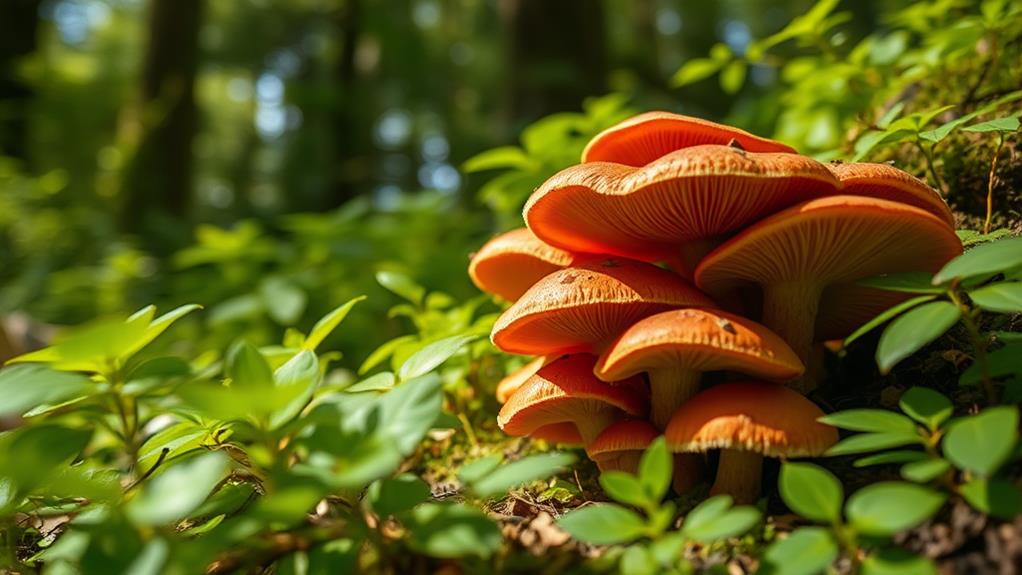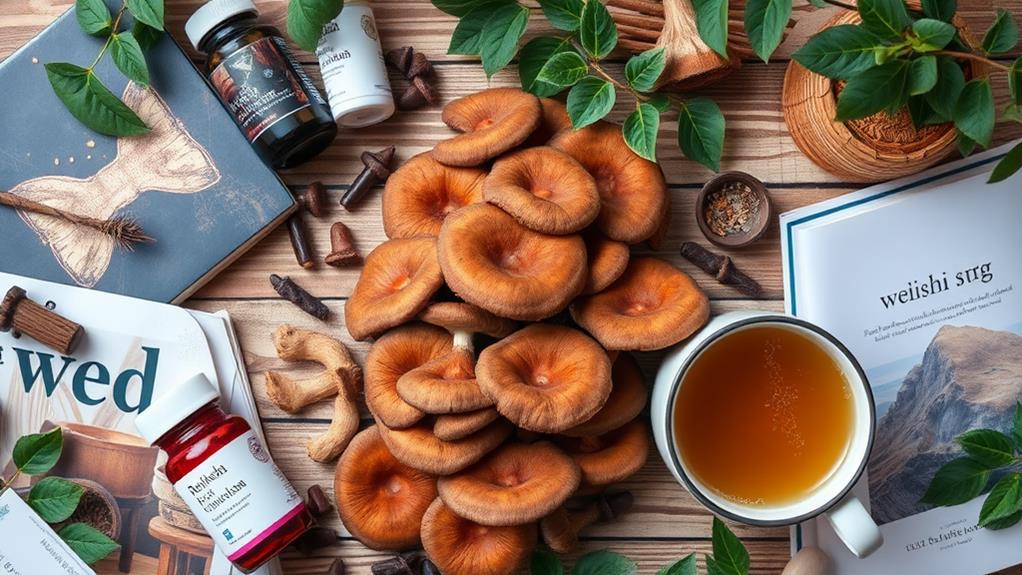
Reishi mushrooms, known as the "mushroom of immortality," can significantly boost your immune system. They're rich in bioactive compounds like triterpenes and polysaccharides, which enhance white blood cell activity, crucial for fighting infections. Research shows that these mushrooms may improve immunity by promoting natural killer cell function, essential for battling illness and even cancer. With various forms available—like powders, teas, and capsules—you can easily incorporate them into your daily routine. While generally safe, it's wise to consult a healthcare professional for personalized advice. Discovering more about their benefits could inspire you to explore their unique properties further.
Overview of Reishi Mushrooms

Reishi mushrooms, or Ganoderma lucidum, have been revered in traditional Asian medicine for over 2,000 years and are often called "the mushroom of immortality."
These fungi are packed with bioactive compounds like triterpenes and polysaccharides, which many believe play a crucial role in boosting immune support. Their ability to enhance immune function is particularly noteworthy, as they promote white blood cell activity, which is essential for defending against pathogens.
You might find reishi available in various forms, such as powders, capsules, and teas, making it easy to incorporate into your daily routine.
The health benefits of reishi are intriguing, especially when it comes to immune system support. Research suggests that reishi may enhance immune function by influencing the activity of white blood cells, key players in your body's defense against illness.
However, it's important to note that study results have shown mixed outcomes, so further research is needed to fully understand its effects.
When considering reishi, its safety profile is generally favorable. Most people experience mild side effects, but if you're on anticoagulants or have existing health conditions, it's wise to consult a healthcare professional before use.
Key Immune Benefits
Harnessing the power of reishi mushrooms can provide significant immune benefits that are hard to overlook. These incredible fungi contain polysaccharides and triterpenes, which may enhance immune function by boosting white blood cell activity.
For instance, a 2006 study showed that colorectal cancer patients taking reishi experienced an increased white blood cell count, suggesting it could support your immune system during cancer treatment. Additionally, reishi mushrooms have been used for over 2,000 years in traditional medicine for their immune-boosting properties, highlighting their long-standing significance in promoting health and wellness traditional uses of reishi.
Furthermore, reishi mushrooms may stimulate natural killer (NK) cell cytotoxicity. NK cells are vital for defending your body against tumors and infections.
Animal studies have also revealed that reishi can enhance T lymphocyte proliferation and cytokine gene expression, further supporting its role in immune modulation.
Some clinical trials have suggested that reishi extract might improve the quality of life for patients undergoing chemotherapy. By supporting their immune system, reishi could help them navigate treatment more effectively.
While more rigorous studies are needed to confirm these effects, the potential benefits of reishi mushrooms for immune health are promising. Incorporating reishi into your routine might be a powerful way to enhance your body's defenses and support your overall well-being.
Dosage Guidelines

To fully reap the immune-boosting benefits of reishi mushrooms, it's important to understand the appropriate dosage guidelines. Recommended daily doses of reishi extracts typically range from 1.5 to 9 grams, as these doses can effectively enhance immune function and support overall health. If you're using whole mushrooms, lower amounts are suggested due to their concentrated benefits.
Here are some key points to consider:
- Start with a lower dosage to assess your sensitivity to reishi.
- Gradually increase the dosage as you monitor your tolerance.
- Follow product instructions closely, as extraction methods can affect potency.
- Consult with a healthcare professional to determine the best dosage for your needs.
- Check the concentration of reishi mushrooms in supplements, as the average is around 100 milligrams.
Additionally, be aware of potential side effects, such as allergic reactions or increased bleeding risk, particularly in individuals with low platelet counts.
For more information on current research insights, it's advisable to stay updated on ongoing studies regarding reishi mushrooms.
Possible Side Effects
When considering reishi mushrooms for immunity support, it's important to be aware of possible side effects.
While reishi is generally safe for most people, some individuals may experience mild symptoms like dizziness or a dry mouth, especially with long-term use.
Those who are undergoing cancer treatment should also be cautious as reishi can interact with certain therapies, potentially affecting immune function in cancer patients.
Additionally, if you have certain health conditions or are on specific medications, the risks could be higher, so it's wise to consult with a healthcare provider before starting.
Common Side Effects
Reishi mushrooms can offer various health benefits, but it's essential to be aware of their potential side effects. While many people tolerate them well, some might experience common side effects. It's always a good idea to monitor how your body reacts.
Here are some possible side effects to keep in mind:
- Dizziness: Some individuals may feel lightheaded after consuming reishi.
- Gastrointestinal discomfort: Higher doses can lead to nausea or stomach upset.
- Allergic reactions: Itchiness, rash, or irritation may occur, especially in sensitive individuals.
- Low platelet counts: Rarely, reishi can cause nosebleeds or bloody stools in those with low platelet counts or who are on anticoagulant medications.
- Pregnant or breastfeeding: Due to insufficient safety data, reishi mushrooms aren't recommended for these groups.
Always consult your healthcare provider before starting any new supplement, particularly if you have underlying health conditions or are taking medications.
Being informed helps you make the best choices for your health while enjoying the potential benefits of reishi mushrooms.
Risk Factors Involved
While reishi mushrooms can be beneficial, it's important to consider the risk factors involved in their use. Some people might experience mild side effects like dizziness and dry mouth, but most find reishi mushrooms safe for immune support.
However, if you're trying them for the first time, be cautious of potential allergic reactions, such as itchiness or rashes. Long-term use may lead to gastrointestinal discomfort, so monitoring your tolerance is essential.
If you're on anticoagulants or immunosuppressants, you should be especially careful, as reishi can heighten the risk of bleeding or amplify the effects of these medications.
Serious side effects, including liver injury and gastrointestinal issues, have been linked to specific formulations of reishi, highlighting the need for careful product selection.
Always consult with healthcare providers to ensure that reishi mushrooms are a safe choice for you. Their guidance can help you navigate any potential risks and enhance your immune support experience.
Prioritizing your health and safety is crucial when incorporating any supplement into your routine.
Research Findings

Emerging research highlights the promising role of reishi mushrooms in bolstering immune function. Studies have shown that these mushrooms can stimulate white blood cell activity, which is crucial for fighting off infections and diseases. For instance, a 2006 study found increased white blood cell counts in colorectal cancer patients who used reishi mushrooms.
Here are some key research findings:
- Reishi polysaccharides may enhance T lymphocyte proliferation and cytokine gene expression.
- Animal studies suggest reishi extract boosts natural killer (NK) cell cytotoxicity, supporting its anti-cancer properties.
- Clinical trials indicate that reishi mushrooms can aid recovery during chemotherapy by improving immune function and overall quality of life.
- A meta-analysis revealed that reishi's immunomodulatory effects are linked to bioactive compounds, such as triterpenes and polysaccharides.
- These compounds may help regulate immune responses, making reishi mushrooms a valuable addition to your health regimen.
With all this evidence, it's clear that incorporating reishi mushrooms into your diet could play a significant role in enhancing your immune function and overall health.
Different Forms Available
When it comes to reishi mushrooms, you've got several options to choose from.
You can enjoy dried mushrooms in tea, take powdered extracts for a concentrated boost, or pop capsules for a quick and easy way to incorporate them into your daily routine.
Each form has its own benefits, so it's important to find the one that suits your needs best.
Types of Reishi Products
Reishi mushrooms come in various forms, each offering unique benefits to suit your lifestyle and health needs. Whether you're looking for convenience or potency, there's a reishi product for you.
- Dried Whole Mushrooms: Great for cooking or brewing into tea, though they may require more preparation.
- Powdered Extracts: These are often more potent due to concentrated bioactive compounds, providing enhanced health benefits compared to whole mushrooms.
- Liquid Extracts: Tinctures offer a faster absorption rate, making them ideal if you're seeking immediate effects.
- Capsules: Perfect for those who dislike the bitter taste of reishi mushrooms, capsules are a convenient and tasteless option.
- Teas: A soothing way to enjoy reishi, infusing the mushrooms in hot water releases their beneficial properties.
When selecting a reishi product, remember that the quality and concentration of active ingredients can vary significantly.
It's crucial to choose reputable brands that undergo quality testing to ensure you're getting the best health benefits.
With so many options available, you can easily incorporate reishi mushrooms into your daily routine for immunity support.
Preparation and Consumption Methods
For those looking to enjoy the benefits of reishi mushrooms, preparation and consumption methods are key. You can find reishi mushrooms in various forms, like dried mushrooms, powdered extracts, capsules, and liquid extracts. Each option offers flexibility based on your preference.
If you prefer a more hands-on approach, dried reishi mushrooms require simmering or boiling to unlock their medicinal properties effectively.
Powdered extracts are a simple way to incorporate reishi into your daily meals. You can easily add the powder to smoothies, soups, or teas, making it a convenient choice for a healthy boost.
If you want to avoid the mushroom's bitter flavor, capsules are an excellent option. They come with clear dosage instructions, so you can easily stick to your regimen.
Liquid extracts are another choice, offering concentrated benefits that might require lower daily dosages, typically between 1.5 to 9 grams. This allows you to customize your intake based on your health needs.
No matter which method you choose, each offers a unique way to enjoy the remarkable properties of reishi mushrooms for immunity support.
Cultural Significance

The cultural significance of reishi mushrooms, often referred to as "Ling zhi" in Chinese and "Lin zi" in Japanese, runs deep in various Asian traditions. For thousands of years, these mushrooms have been treasured not just for their medicinal properties but also for their association with longevity and health.
In traditional Chinese medicine, reishi is called the "mushroom of immortality," highlighting its vital role in promoting overall well-being.
Reishi mushrooms have a rich history, celebrated in many ways:
- Symbol of Longevity: Associated with a long and healthy life.
- Holistic Health Practices: Integral to traditional Chinese medicine.
- Art and Literature: Featured in various artworks and stories throughout history.
- Spiritual Rituals: Used in ceremonies to promote wellness and balance.
- Cultural Icons: Represent harmony and the connection between health and culture.
These elements illustrate how reishi mushrooms are more than just a health supplement; they embody a cultural legacy.
Their esteemed place in Asian traditions reflects a deep-rooted belief in their ability to enhance vitality and support the immune system, bridging the gap between physical and spiritual health.
Drug Interactions
When considering reishi mushrooms for immunity support, it's important to be aware of possible drug interactions.
If you're taking anticoagulants like aspirin or warfarin, reishi might increase your risk of bleeding, so caution is essential.
Additionally, if you're on immunosuppressants, combining them with reishi could make you more prone to infections, highlighting the need to consult with your healthcare provider before adding this supplement to your routine.
Bleeding Risk Assessment
Reishi mushrooms' potential blood-thinning properties can pose significant risks for individuals taking anticoagulant medications like aspirin and warfarin. If you're using these blood thinners, you'll want to exercise caution when considering reishi supplements. This combination can heighten the bleeding risk and lead to adverse events.
It's crucial to discuss all supplements with your healthcare provider to ensure safety and minimize risks.
Here are some key points to consider regarding reishi and bleeding risk:
- Reishi may increase bleeding risk, especially at high doses.
- Individuals with low platelet counts should be particularly cautious.
- Those undergoing surgical procedures should avoid reishi close to their surgery date.
- The quality and concentration of reishi products can vary, complicating safety assessments.
- Always consult your healthcare provider before combining reishi supplements with anticoagulants.
Staying informed about the potential interactions between reishi and blood thinners is essential for your safety.
While reishi offers immune support benefits, you must weigh these against the risks of increased bleeding. Prioritizing safety ensures that you can enjoy the benefits without compromising your health.
Anticoagulant Interactions
Considering the potential interactions between reishi mushrooms and anticoagulants is crucial for anyone on blood-thinning therapy. Reishi mushrooms might enhance the effects of anticoagulants like aspirin or warfarin, increasing the risk of bleeding. If you're taking these medications, be cautious about adding reishi supplementation to your routine.
The interactions between reishi and anticoagulants can lead to serious issues, such as excessive bleeding or unusual bruising. It's important to monitor for signs of increased bleeding if you decide to incorporate reishi mushrooms into your regimen. These symptoms could be subtle, but they're vital indicators of how your body is reacting.
Always consult your healthcare provider before combining reishi mushrooms with blood-thinning medications. They can help ensure your safety and manage any potential interactions effectively.
Your healthcare provider will guide you on the best course of action, considering your specific health needs. Remember, prioritizing safety is essential when dealing with any supplementation, especially when anticoagulants are involved. Being informed and proactive about these interactions can help you make the best choices for your health.
Immunosuppressant Effects
While exploring the benefits of reishi mushrooms, it's essential to understand their potential interactions with immunosuppressant medications. Reishi mushrooms are known for their immune modulation properties, but combining them with immunosuppressants can pose risks. You might face an increased risk of infections or see a reduction in how well your medications work.
Here are some key points to consider:
- Reishi may enhance the effects of immunosuppressants, leading to greater vulnerability.
- Mixing reishi with anticoagulants can heighten the risk of bleeding, especially if you have low platelet counts.
- The interaction with high blood pressure medications can cause unpredictable blood pressure changes.
- Reishi mushrooms can alter the metabolism of drugs by affecting cytochrome P450 enzymes, which may change their therapeutic effects.
- Always consult your healthcare provider before adding reishi mushrooms to your regimen to avoid adverse interactions.
Being aware of these interactions helps you make informed decisions about your health.
Popularity and Trends

Why has interest in reishi mushrooms surged recently? You might've noticed their popularity growing, especially in wellness products and dietary supplements. Known as "the mushroom of immortality," reishi mushrooms are becoming a go-to choice for those seeking immune support and natural remedies.
The rise of social media platforms like TikTok has also played a big role in this trend. Users share personal experiences and health benefits, sparking curiosity among viewers.
Moreover, the holistic health movement emphasizes using reishi to enhance immune function, reduce stress, and improve overall well-being. As a result, you can find a wide range of reishi products on the market, including powders, capsules, and teas, catering to different preferences.
This surge in popularity reflects a broader trend toward natural health solutions.
However, as the market for dietary supplements expands, it's essential to research and verify the quality of reishi products. Ensuring safety and efficacy should always be your priority.
With more options than ever, you have the opportunity to explore reishi mushrooms and discover their potential health benefits for yourself.
Practical Usage Tips
If you're looking to boost your immune system with reishi mushrooms, there are several practical ways to incorporate them into your routine. First, choose high-quality products, such as powdered supplements, capsules, or teas, to ensure you're getting effective immune support.
It's important to follow the product-specific instructions for the optimal dosage, which typically ranges from 1.5 to 9 grams per day.
Here are some tips to help you get started:
- Start with a low dose and gradually increase it to assess your tolerance.
- Mix reishi powder into your morning smoothie or oatmeal.
- Brew reishi tea for a calming evening ritual.
- Take capsules with meals to make it part of your daily routine.
- Always consult with a healthcare professional, especially if you're on anticoagulants or have health conditions.
Conclusion
Incorporating reishi mushrooms into your routine might just be the immune boost you need—unless, of course, you prefer to fight off colds with a steady diet of chicken soup and wishful thinking. With their impressive health benefits and rich history, these fungi remind us that nature can be our best ally. So, whether you're sipping reishi tea or popping capsules, you're not just boosting immunity; you're joining a centuries-old tradition of wellness. Cheers to your health!
